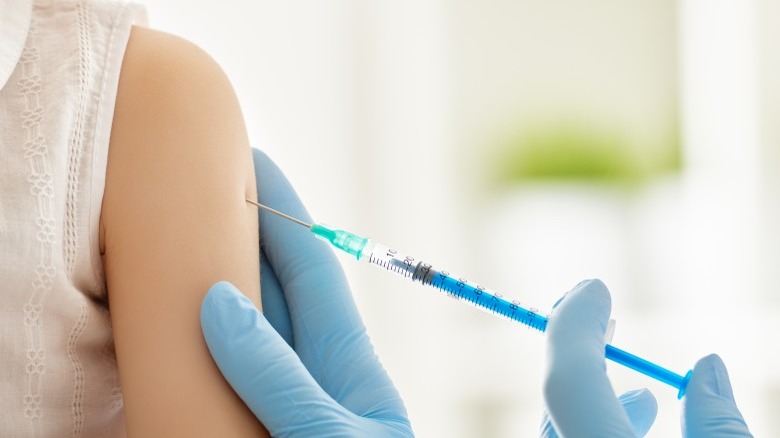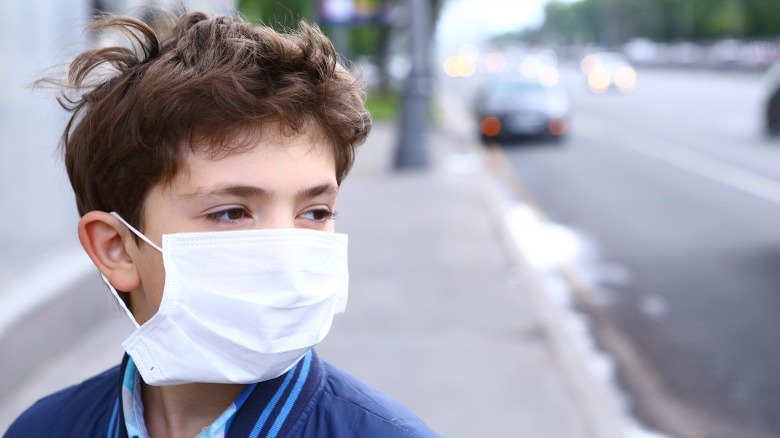The Untold Truth Of Vaccines
For parents, there are few topics more controversial than vaccines. Do you vaccinate? Why or why not? There's nothing worse than making a cool new mom friend, only to find out that she is on the opposite side of the vaccine argument.
Once hailed as lifesavers, vaccines have taken a beating in recent years. From mercury concerns to autism myths, it can be hard to separate fact from fiction. As a nurse, I've spent the last 10 years giving and studying vaccines, and I'm here to clear up some confusion. There will always be new studies coming out, but for now, here are the untold facts of vaccines, as we know it.
Vaccines save lives
Now that vaccines are just an accepted part of healthcare, we forget that they once revolutionized the way we prevent disease. In 1900 one in ten babies did not make it to their first birthday because of communicable disease. Because of vaccines, smallpox was completely eradicated worldwide. In 1994, Americans were no longer at risk for poliovirus because of the vaccine.
The only problem with vaccines being so effective is that we now take them for granted. I certainly don't know anyone who has died from polio or measles, so it's not even on my radar that those diseases are dangerous and could come back in full force if we stopped vaccinating. Even though many vaccine-preventable diseases are no longer a risk in the U.S., they are still in other countries. That means that when an unvaccinated person travels or comes to the U.S., those old diseases could resurface.
Because so many of us take vaccines for granted, we may be tempted to "risk it" and skip getting vaccinated. In fact, according to the American Academy of Family Physicians, 25 percent of parents in their survey were concerned that too many vaccines could weaken their child's immune system. There is no evidence to support that, but the vaccine rumor mills are strong.
They may not last forever
If you received vaccines as a child, chances are you're not too concerned about coming down with polio or mumps. However, research has shown that not all vaccines last a lifetime. If you work in an area where you need to prove that you are immune to certain diseases, such as a hospital or school, you may find out that your immunity has faded over time and you need a booster shot to be fully protected.
In 2006 CBS reported on a mumps outbreak across college campuses. Most of the infected students had received the recommended two shots as kids, but they were still susceptible. Nearly 6,600 students came down with mumps, and 84 percent of them were fully immunized. Researchers believed that the outbreak started with students from other countries who were not immunized as children. "If there's another outbreak, we would evaluate the potential benefit of a third dose to control the outbreak," researcher Dr. Jane Seward, deputy director of the CDC's viral diseases division told CBS. Check with your doctor to make sure you're up to date and protected.
They could be free
When you make sure your child is vaccinated, you're not just protecting your own child. You're helping ensure that outbreaks in schools and communities don't happen. Because it's so important to vaccinate as many people as possible, insurance companies and healthcare providers are doing their part by making them accessible, and sometimes even free.
Make sure to check the Centers for Disease Control and Prevention (CDC) website to find out if you are eligible for free vaccines. You can obtain vaccines at your primary doctor's office, public health department, or even local pharmacy. Often insurance will cover preventive care like annual exams and vaccines.
They don't cause autism
I have some tough love for you. Jenny McCarthy is a celebrity, not a doctor. While celebrities have a platform to share their opinions about vaccines, those are only opinions, not facts. I know we all know this, but it bears repeating. I am not about to put the health and safety of my child in Jenny's hands. We have scoured the research, and there is simply no credible link between vaccines and autism.
So where did this all start? On November 12, 2000, CBS ran a report about a possible link. A group of London parents had noticed that their children were being diagnosed with developmental delays shortly after receiving their shots. The physicians involved released a statement that they could not make a direct connection to the shots, but the story was already out there. One physician, Dr. Andrew Wakefield, published a paper on the possible link, but was later found guilty of "ethical, medical, and scientific misconduct" for putting that rumor out there with no proof.
The Institute of Medicine has stated that the current evidence "favors rejection of a causal relationship at the population level between MMR vaccine and ASD (autistic spectrum disorders)." They were also unable to find a link between thimerosal-containing vaccines and ASD. The committee even went so far as to recommend that all funds for autism research be "channeled to the most promising areas." In other words, let's use these precious research funds to find a cure, rather than beating a dead horse. If you have any concerns, always talk with your doctor.
Speak up if you're pregnant (or trying)
When you're pregnant, there is a lot on your mind. Should we find out the gender? Will I return to work? Where did I put my keys? One more thing to add to that black hole of pregnancy brain is making sure you get the right vaccines — and avoid the wrong ones.
The Advisory Committee on Immunization Practices has stated that it is important for both the mother and the baby to be immunized. "Benefits of vaccinating pregnant women usually outweigh potential risks when the likelihood of disease exposure is high, when infection would pose a risk to the mother or fetus, and when the vaccine is unlikely to cause harm," they stated in a report. For example, it's recommended that pregnant women receive a dose of the TDap vaccine (Tetanus, Diphtheria, and Pertussis) because it will help protect the baby from those diseases.
Some vaccines, like measles mumps rubella (MMR) and chickenpox (Varicella) contain tiny doses of live virus, so they should be avoided during pregnancy. Even if you're not pregnant yet, let the nurse know that you are currently trying to conceive if you're receiving a vaccine. Once you have the baby, you'll be safe to get those ones again if you need a booster.
Some side effects are normal
It's important to remember than some side effects from vaccines are normal and even expected. It would be impossible for you to be punctured with a needle and fluid put into your muscle without your body reacting to it. Normal side effects include pain and redness at the injection site. Some slight swelling or a bruise is also possible and should only last a few days. If you have an infant or toddler, you might notice they feel a little warm and seem a little irritable after getting their shots. According to the American Academy of Family Physicians, giving Tylenol after the shots could help with these side effects.
Those diseases are still around
Because our vaccines are so effective, we often don't realize how close we are to an outbreak. If enough people decline to vaccinate, diseases that were once eradicated will come back.
A study in the Journal of the American Medical Association studied a measles outbreak at a school where some parents chose not to have their children vaccinated. The report found that children who were not immunized with the MMR vaccine were 22 times more likely to develop measles and six times more likely to develop pertussis (whooping cough) than those who received vaccines. The children who contracted measles were infected at school. Sadly, because no vaccine is 100 percent effective, even some children who were immunized came down with measles or pertussis.
Vaccine-preventable diseases are dangerous
With such a focus on vaccines and their safety, it's easy to forget why we have them in the first place. Vaccines prevent diseases that could kill us or our children. We take them for granted now, but our world would look very different without them. For example, because of most children in our country receiving the MMR vaccine, the U.S. has approximately 600 cases of measles every year. These numbers look very different worldwide, where many children don't have access to this vaccine. Every year 344,000 cases of measles are reported, and 145,000 people die from the disease.
There are over 2 million cases of Hepatitis B worldwide every year, and half of those people die. In the U.S., there are about 100,000 cases resulting in 5,000 deaths every year. Americans don't typically worry about polio anymore, because so many of us are vaccinated. However, if your unvaccinated child was ever exposed to and contracted polio, the consequences could be dire. Polio attacks the central nervous system and looks like the flu. It can then progress to meningitis or even paralysis.
Thimerosal is being removed from vaccines
Some anti-vaccine advocates have stated that vaccines are unsafe because of their ingredients. Vaccines contain weakened or dead versions of viruses, so that our bodies recognize them as foreign and start making antibodies toward them. It's these antibodies that protect us when we are exposed to these diseases throughout our lives. In addition to the viruses themselves, vaccines contain preservatives to keep them from becoming contaminated.
Thimerosal is a preservative that contains ethyl mercury and is used in vials of vaccines to prevent contamination. It is used to preserve multi-use vials of vaccine. The American Academy of Family Physicians reported that "in 1999, the FDA determined that infants who received multiple thimerosal-containing vaccines might be exposed to more mercury than is recommended." Thimerosal is actually now being eliminated from children's vaccines. According to the American Academy of Family Physicians, there is no evidence of harm from the amount of thimerosal found in vaccines. However, they still recommend removing it from all childhood vaccines as a precaution.
We're already exposed to vaccine ingredients everyday
Vaccines also contain adjuvants, which are substances to help stimulate our immune systems. They help signal to our bodies that it's time to make antibodies against this disease, which are what protect us if we are ever exposed. Adjuvants make it possible for us to need smaller doses and fewer vaccines throughout our lives. One adjuvant in particular that anti-vaccine advocates are concerned about is aluminum. And sure, if you were to inject copious amount of aluminum into your bloodstream, you would get aluminum toxicity. However, the tiny amount in vaccines has undergone countless tests and studies and is proven to be safe.
It's important to remember that we are all exposed to aluminum everyday, whether we receive vaccines or not. Aluminum is found in the foods we eat like fruits and vegetables, flour, cereal, even infant formula. As the third most abundant element on earth, it is in the air, soil, and water all around us. According to the Children's Hospital of Philadelphia, infants receive much more aluminum from their diets than from vaccines in their first years of life.
Another scary-sounding vaccine ingredient is formaldehyde. In high doses, formaldehyde can cause damage to our DNA, so it's important to know the facts. What many anti-vaccine advocates may not realize is that formaldehyde is actually essential to our bodies, and it's already in all of us. We all contain small amounts of formaldehyde, because our bodies use it for building amino acids (proteins) in the blood. In fact, quantities of formaldehyde over 600 times stronger than those in vaccines have been given to animals safely.
With any vaccine ingredient, make sure you look at the amount. It's easy to write a scary blog post about the dangers of these elements out of context, but when you learn that we're already exposed to these in our everyday lives, it's easier to understand why they are safe in these doses.
We're on the brink of curing AIDS
While most of our vaccines have been around for decades, there are always new ones on the horizon. According to the Colorado Children's Immunization Coalition, in 2012 there were 300 new vaccines being tested and evaluated by the Food and Drug Administration (FDA). A priority for physicians and scientists is developing a safe and affordable vaccine to prevent AIDS.
A vaccine for HIV and AIDS is being tested right now. This vaccine trial, called HVTN 072, is being tested in South Africa. Researchers are also working on creating vaccines for chronic conditions like cancer, diabetes, and Alzheimer's.
Many new vaccines are now possible because of the creation of DNA vaccines. These vaccines are able to target the specific germs and pathogens by injecting actual DNA into the body.
We now have an Ebola vaccine
Speaking of new vaccines, science had a big win recently. The new Ebola vaccine has been shown to be 100 percent effective at protecting against the disease. After the devastating 2014 outbreak that killed over 11,000 people in Africa and spread overseas, scientists and researchers began testing vaccines right away. The Ebola vaccine is not officially approved yet, but there is a supply of 300,000 of them ready to go in case of emergency. "It's certainly good news with regard to any new outbreak — and one will occur somewhere," Dr. Anthony S. Fauci, director of the National Institute for Allergy and Infectious Diseases told the New York Times. "But we still need to continue working on Ebola vaccines."
Not everyone should get vaccinated
While vaccines save lives and are recommended for most people, not everyone should run to the doctor for the latest vaccine. If you've ever had a severe or life-threatening reaction to a vaccine, your doctor might recommend skipping vaccines from now on. Because some vaccines introduce a small amount of virus into your system, people with any immune system problems should not receive the vaccine. If your immune system isn't working properly, it will not respond to the vaccine how it should, and you could become very ill. Also, even if you're just coming down with a cold, you should hold off on getting that flu shot until you feel better.
What to do if you have a reaction
Severe, life-threatening reactions to vaccines have happened in the past, but are incredibly rare. For example, let's look at a common vaccine. For every million people who receive the flu shot, 0.7 of them will experience anaphylaxis (difficulty breathing) after receiving the shot. While these reactions are so incredibly rare, they still sound scary and can absolutely make people pause before receiving the vaccine. Always talk with your doctor if you have concerns.
If you are concerned that you or your child experienced a severe reaction, make sure to let your doctor know and seek emergency care if needed. Then report it to the Vaccine Adverse Event Reporting System (VAERS). Anyone can log onto this site and see the current research on vaccine reactions.














